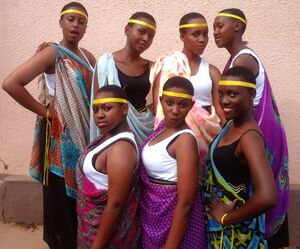نكولى (شعب)
The Nkole people also known as the Banyankole, are a Bantu ethnic group native to the Ankole region[1] of Uganda. They are primarily found in the southwestern part of the country, in what was historically known as the Ankole Kingdom. The Banyankole are known for their rich cultural heritage and traditional cattle-keeping practices. They are closely related to other Bantu peoples of the region, namely the Nyoro, Kiga, Toro and Hema people.
التاريخ
Banyankole | |
|---|---|
 | |
| إجمالي التعداد | |
| 3,216,332[2][3] | |
| المناطق ذات التجمعات المعتبرة | |
| اللغات | |
| Runyankole and English | |
| الدين | |
| Predominantly Christianity and Ankole Religion; minority Islam | |
| الجماعات العرقية ذات الصلة | |
| other Rutara people (Bakiga, Batooro, Banyoro, Bahema, Bahaya and Baruuli) |
Origins and Early History
The Banyankole are part of the larger Bantu-speaking peoples who migrated from Central and West Africa to the Great Lakes region of East Africa over a millennium ago.
Archaeological evidence[4] and oral traditions suggest that the Banyankole settled in the Ankole region between the 10th and 15th centuries. Their early history is characterized by the establishment of the Ankole Kingdom, a centralized monarchy that played a significant role in the region's politics and culture.
الثقافة
اللغة
البانيانكولى يتكلمون رونيانكولى، وهي إحدى لغات البانتو وترتبط بقوة بلغات أخرى في المنطقة مثل روكيگا ورونيورو و Rutooro. Runyankole serves as a vital part of the these people's identity used in everyday communication and cultural ceremonies وتُستخدم على نطاق واسع في جنوب غرب البلد.
البنية الاجتماعية
Traditional Banyankole society is divided into two main social classes: the Bahima and the Bairu. The Bahima are primarily cattle herders, known for their long-horned Ankole cattle, while the Bairu are primarily agriculturalists. This division has historically influenced social roles and interactions within Banyankole communities.
| الشخص | OmunyaNkore |
|---|---|
| الشعب | AbanyaNkore |
| اللغة | OrunyaNkore |
| البلد | Nkore |
Religion
The Banyankole tribe in Uganda is predominantly Christian, with a significant majority of its members practicing Christianity. The Banyankole people are primarily adherents of the Roman Catholic and Anglican (Church of Uganda) denominations. According to the 2002 Census of Uganda 52.6% of Banyankole are Anglican and 34.8% are Roman Catholic. A minority at 5.2% are Muslim and 4.6% Pentecostal.[5]
Names
There are several names they are referred to as. These include the following ones: Ankole, Ankori, Banyankole, Banyankore, Nkoles, Nkore, Nyankole, Nyankore, Ouanyankori, Runyankole, Runyankore, Uluyankole, Uluyankore.[6]
References
- ^ (in en)Ankole sub-region, 2023-10-03, https://en.wikipedia.org/w/index.php?title=Ankole_sub-region&oldid=1178450512, retrieved on 2024-06-17
- ^ "Uganda". World Directory of Minorities and Indigenous Peoples. 2 November 2023.
- ^ Uganda Bureau of Statistics. "National Population and Housing Census 2014 - Main Report" (PDF).
- ^ Roscoe, John (September 2011). The Northern Bantu (in English) (1st ed.). Cambridge Library Collection - Anthropology: Cambridge University Press (published 2011). pp. 99–100. doi:10.1017/CBO9780511697180. ISBN 978-1-108-01072-6.
{{cite book}}: CS1 maint: unrecognized language (link) - ^ "Population Composition" (PDF). ubos.org. Retrieved 7 August 2023.
- ^ Source LCSH, BnF [1]
Other sources
- John Roscoe, The Banyankole: the second part of the report of the Mackie Ethnological Expedition to Central Africa, Cambridge University Press, Cambridge, 1923, 176 p.
External links
- (in فرنسية) « Nkole (peuple d'Afrique) » (notice LCSH, BnF)